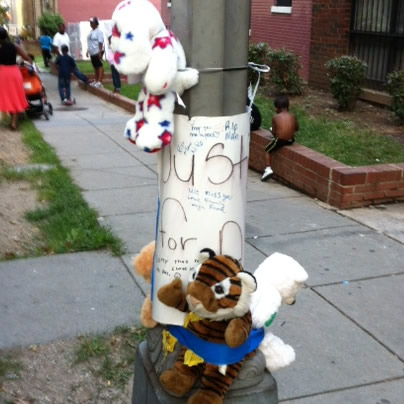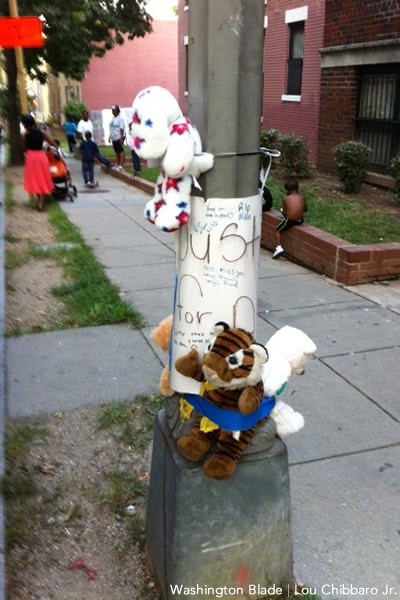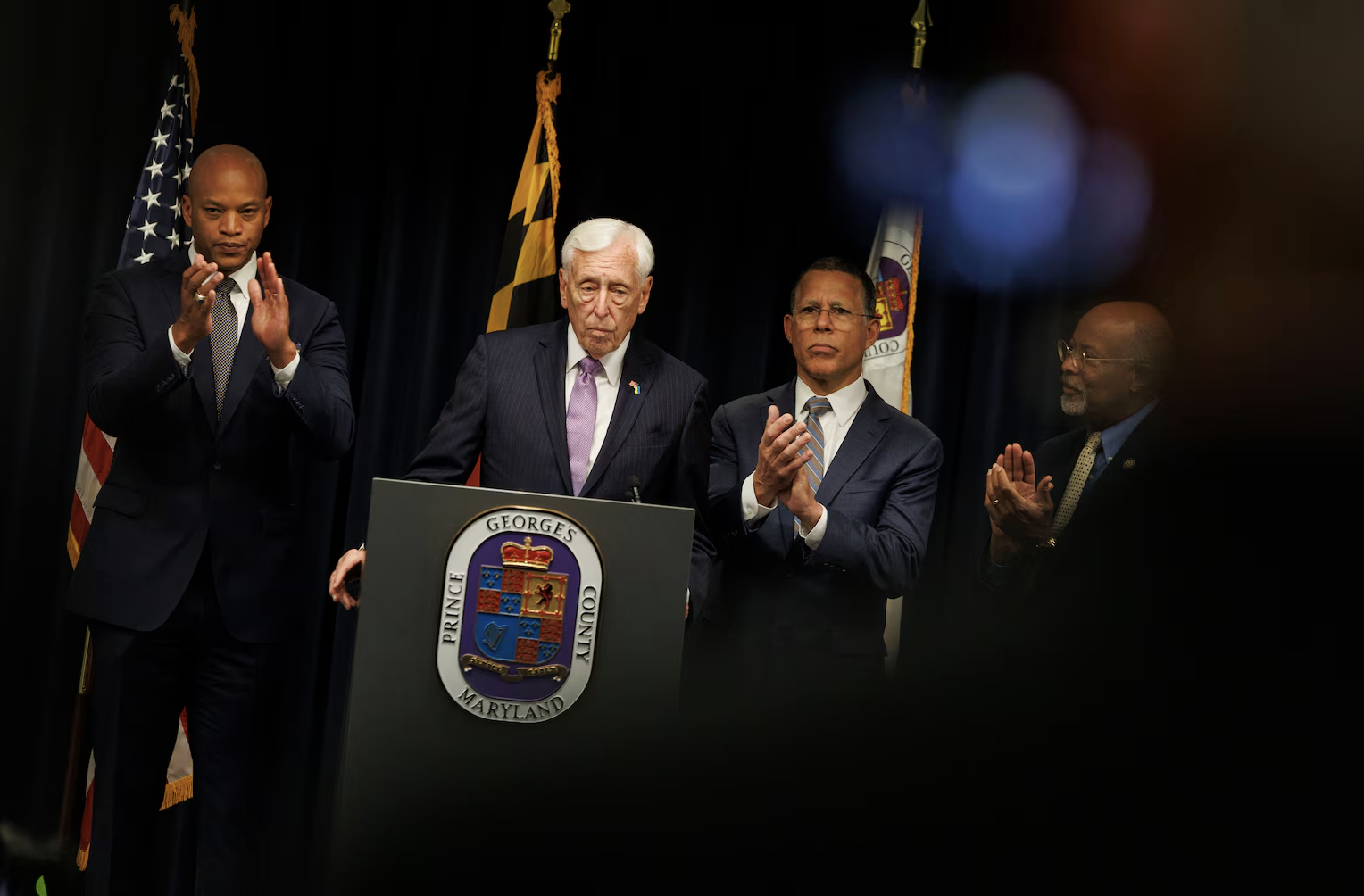Local
Man charged in D.C. murder says victim was gay
Police say man shot, set on fire in Euclid Street apartment


Friend and neighbors of Randolph Scott Harris Jr. set up a memorial for him outside the apartment building where he was murdered on July 26. (Washington Blade photo by Lou Chibbaro, Jr.)
A D.C. man charged with first-degree murder while armed in connection with the July 26 shooting death of D.C. resident Randolph Scott Harris Jr., 31, told homicide detectives Harris was gay and tried to establish a relationship with him.
According to a six-page police affidavit in support of the Aug. 1 arrest of Jermaine Brown, 34, Brown allegedly shot Harris three times while attempting to rob him inside Harris’s apartment at 1034 Euclid St., N.W.
The D.C. Medical Examiner determined that Harris, who worked for a contractor that provided services for 7-Eleven stores, died of both gunshot wounds and severe burns. The affidavit says Harris appears to have been set on fire while alive and seated on a wicker chair in the living room of his apartment.
The arrest affidavit says Brown gave several conflicting versions of his actions and whereabouts on the night before Fire Department rescue workers found Harris unconscious in his apartment shortly after 6 a.m. on July 26. Police said residents in the building called 911 after they noticed smoke coming from Harris’s second-floor apartment.
The affidavit says homicide detectives linked Brown to the murder after discovering he was in possession of items missing from Harris’s apartment, including iPhones and an iPad. It says Brown later admitted using a “spare key” to take Harris’s Mercedes SUV, which was reported stolen from the apartment building where Harris lived.
“He reported that he would visit the decedent, who he called by the nickname “Man,” the police affidavit says. “[H]owever, he said he had just met Man. Defendant 1 [Brown] referred to Man as gay and that Man tried to ‘holla’ at him (tried to talk to establish a relationship),” says the affidavit.
“[H]e denied ever ‘going that way’ because something is wrong with it and he sees a problem with it,” the affidavit says in referring to Harris’s sexual orientation. “He described it as being nasty.”
The affidavit says that in a follow-up interview just prior to his arrest Brown admitted to stealing Harris’s Mercedes and then told detectives “he occasionally engaged in sex with men, but that he has never had a sexual relationship with the decedent.”
Court records show that prosecutors with the U.S. Attorney’s office didn’t list the murder charge filed against Brown as a hate crime.
William Miller, a spokesperson for the U.S. Attorney’s office, said the office doesn’t comment on pending cases.
Gay activists have expressed concern over past cases in which suspects charged with killing or assaulting a gay man have invoked the so-called gay panic defense. The defense involves claims by defendants that they killed or assaulted a gay man after the gay man allegedly propositioned them for sex, causing the defendant to panic and commit a violent act that should be excused as a form of self-defense.
Anthony Lorenzo Green, a Ward 8 Advisory Neighborhood Commissioner who is gay, said he and Harris were in a relationship in 2007 and remained close friends after the relationship ended. He said most people who knew Harris knew he was gay and that his sexual orientation did not matter.
“He was a giving person. He wouldn’t try to take advantage of anyone,” Green said. “This just burns me up that this would happen to somebody who was such a loving person.”
At the request of prosecutors, a Superior Court judge ordered Brown held without bond pending an Aug. 22 preliminary hearing, at which time prosecutors are expected to request that he be held until the time of his trial.
The local blog Homicide Watch D.C. posted a copy of the affidavit in support of Brown’s arrest on its website.
Hassan Naveed, co-chair of the D.C. group Gays and Lesbians Opposing Violence (GLOV), said the D.C. police Critical Incident Task Force, which monitors LGBT-related crimes, sent GLOV and local LGBT activists an alert informing them about Harris’s murder.
WJLA-7 News reported that family members and neighbors who knew Harris expressed shock over his death, saying he was well liked in the apartment building where he lived.
“I just can’t imagine who would do such a thing,” WJLA quoted a friend, Sabrina Kenney, as saying.
Friends and neighbors from the apartment building on Euclid Street set up a memorial for Harris directly in front of the building by placing toy stuffed animals and a poster-size placard bearing notes expressing their fondness for him on a sidewalk lamppost.
“We love you, Randy,” said one of the notes.
Virginia
Gay Va. State Sen. Ebbin resigns for role in Spanberger administration
Veteran lawmaker will step down in February

Alexandria Democrat Adam Ebbin, who has served as an openly gay member of the Virginia Legislature since 2004, announced on Jan. 7 that he is resigning from his seat in the State Senate to take a job in the administration of Gov.-Elect Abigail Spanberger.
Since 2012, Ebbin has been a member of the Virginia Senate for the 39th District representing parts of Alexandria, Arlington, and Fairfax counties. He served in the Virginia House of Delegates representing Alexandria from 2004 to 2012, becoming the state’s first out gay lawmaker.
His announcement says he submitted his resignation from his Senate position effective Feb. 18 to join the Spanberger administration as a senior adviser at the Virginia Cannabis Control Authority.
“I’m grateful to have the benefit of Senator Ebbin’s policy expertise continuing to serve the people of Virginia, and I look forward to working with him to prioritize public safety and public health,” Spanberger said in Ebbin’s announcement statement.
She was referring to the lead role Ebbin has played in the Virginia Legislature’s approval in 2020 of legislation decriminalizing marijuana and the subsequent approval in 2021of a bill legalizing recreational use and possession of marijuana for adults 21 years of age and older. But the Virginia Legislature has yet to pass legislation facilitating the retail sale of marijuana for recreational use and limits sales to purchases at licensed medical marijuana dispensaries.
“I share Governor-elect Spanberger’s goal that adults 21 and over who choose to use cannabis, and those who use it for medical treatment, have access to a well-tested, accurately labeled product, free from contamination,” Ebbin said in his statement. “2026 is the year we will move cannabis sales off the street corner and behind the age-verified counter,” he said.
Maryland
Steny Hoyer, the longest-serving House Democrat, to retire from Congress
Md. congressman served for years in party leadership

By ASSOCIATED PRESS and LISA MASCARO | Rep. Steny Hoyer of Maryland, the longest-serving Democrat in Congress and once a rival to become House speaker, will announce Thursday he is set to retire at the end of his term.
Hoyer, who served for years in party leadership and helped steer Democrats through some of their most significant legislative victories, is set to deliver a House floor speech about his decision, according to a person familiar with the situation and granted anonymity to discuss it.
“Tune in,” Hoyer said on social media. He confirmed his retirement plans in an interview with the Washington Post.
The rest of this article can be found on the Baltimore Banner’s website.
District of Columbia
Kennedy Center renaming triggers backlash
Artists who cancel shows threatened; calls for funding boycott grow

Efforts to rename the Kennedy Center to add President Trump’s name to the D.C. arts institution continue to spark backlash.
A new petition from Qommittee , a national network of drag artists and allies led by survivors of hate crimes, calls on Kennedy Center donors to suspend funding to the center until “artistic independence is restored, and to redirect support to banned or censored artists.”
“While Trump won’t back down, the donors who contribute nearly $100 million annually to the Kennedy Center can afford to take a stand,” the petition reads. “Money talks. When donors fund censorship, they don’t just harm one institution – they tell marginalized communities their stories don’t deserve to be told.”
The petition can be found here.
Meanwhile, a decision by several prominent musicians and jazz performers to cancel their shows at the recently renamed Trump-Kennedy Center in D.C. planned for Christmas Eve and New Year’s Eve has drawn the ire of the Center’s president, Richard Grenell.
Grenell, a gay supporter of President Donald Trump who served as U.S. ambassador to Germany during Trump’s first term as president, was named Kennedy Center president last year by its board of directors that had been appointed by Trump.
Last month the board voted to change the official name of the center from the John F. Kennedy Memorial Center For The Performing Arts to the Donald J. Trump And The John F. Kennedy Memorial Center For The Performing Arts. The revised name has been installed on the outside wall of the center’s building but is not official because any name change would require congressional action.
According to a report by the New York Times, Grenell informed jazz musician Chuck Redd, who cancelled a 2025 Christmas Eve concert that he has hosted at the Kennedy Center for nearly 20 years in response to the name change, that Grenell planned to arrange for the center to file a lawsuit against him for the cancellation.
“Your decision to withdraw at the last moment — explicitly in response to the Center’s recent renaming, which honors President Trump’s extraordinary efforts to save this national treasure — is classic intolerance and very costly to a non-profit arts institution,” the Times quoted Grenell as saying in a letter to Redd.
“This is your official notice that we will seek $1 million in damages from you for this political stunt,” the Times quoted Grenell’s letter as saying.
A spokesperson for the Trump-Kennedy Center did not immediately respond to an inquiry from the Washington Blade asking if the center still planned to file that lawsuit and whether it planned to file suits against some of the other musicians who recently cancelled their performances following the name change.
In a follow-up story published on Dec. 29, the New York Times reported that a prominent jazz ensemble and a New York dance company had canceled performances scheduled to take place on New Year’s Eve at the Kennedy Center.
The Times reported the jazz ensemble called The Cookers did not give a reason for the cancellation in a statement it released, but its drummer, Billy Hart, told the Times the center’s name change “evidently” played a role in the decision to cancel the performance.
Grenell released a statement on Dec. 29 calling these and other performers who cancelled their shows “far left political activists” who he said had been booked by the Kennedy Center’s previous leadership.
“Boycotting the arts to show you support the arts is a form of derangement syndrome,” the Times quoted him as saying in his statement.
-

 National4 days ago
National4 days agoWhat to watch for in 2026: midterms, Supreme Court, and more
-

 District of Columbia5 days ago
District of Columbia5 days agoTwo pioneering gay journalists to speak at Thursday event
-

 a&e features5 days ago
a&e features5 days agoQueer highlights of the 2026 Critics Choice Awards: Aunt Gladys, that ‘Heated Rivalry’ shoutout and more
-

 Colombia4 days ago
Colombia4 days agoBlade travels to Colombia after U.S. forces seize Maduro in Venezuela

















